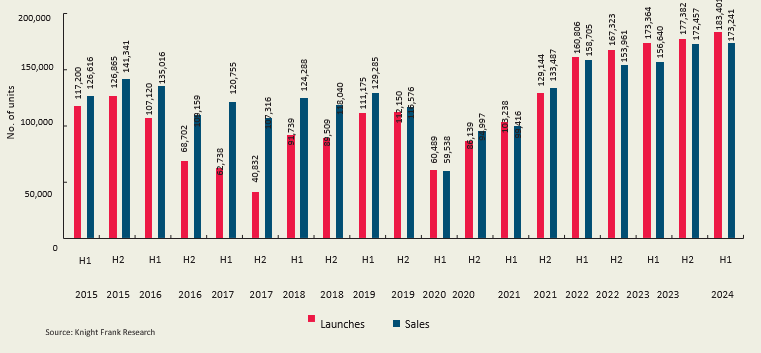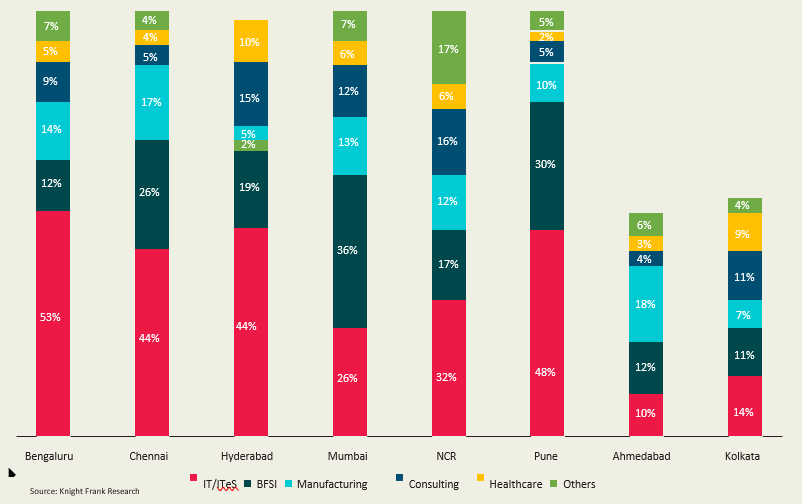The first half of 2024 has been a period of remarkable resilience and transformation for the Indian real estate market. Despite global economic challenges such as high interest rates, geopolitical tensions, and inflation, the market has demonstrated significant adaptability and growth. Knight Frank LLP is the leading independent, global property consultancy headquartered in London which advises clients ranging from individual owners and buyers to major developers, investors and corporate tenants. Clean India Journal publishes an extract of their findings in real estate trends as seen in the first half (H1) of 2024, in Indian corporate and residential real estate growth, demand for sustainable buildings and practices and adoption of technology in smart living spaces.
According to the study, the Indian residential real estate market has shown resilience and growth in the first half of 2024. While India’s real estate industry has experienced a broad-based recovery across all segments, the residential market has seen the swiftest and steepest resurgence with sales volumes in the primary market have grown at a healthy annualized rate of 29% since 2020. Market sentiments have been very positive largely due to an upbeat economic outlook with GDP growth rates at the highest levels in the world, even in the backdrop of a volatile global geopolitical scenario caused by the Israel-Palestine and Russia-Ukraine wars.
The residential market sustained its momentum in 2024 with sales in H1 2024 scaling an 11-year high representing a healthy 11% growth in YoY half-yearly terms. Homebuyer preferences are evolving rapidly, with residential units priced over INR 10 mn constituting 41% of the total sales and has been the primary driver for overall growth during H1 2024 as homebuyer focus has shifted to the premium priced category.
Development activity has also scaled up to match the demand that the residential market is currently seeing. The 0.18 mn units launched in H1 2024 represent a 10-year high in terms of units launched in a half-yearly period and developers are well attuned to the changing preferences of the homebuyer that are now leaning significantly toward experiential living and an upgraded lifestyle. Developers have been ahead of the curve and have judged the shifting preferences of the market by launching lifestyle-oriented premium products.

Launches and Sales Trend
In the Indian office market, the positive sentiment around the economy has again been the primary driver of occupier activity which has sustained the momentum gathered since 2022 and culminated in near-record annual transaction volumes in 2023. H1 2024 has racked up the highest ever transaction volumes in a half yearly period at 3.2 mn sq m (34.7 mn sq ft). Companies based in the West have also been increasing their business operations in India and setting up global capability centers (GCC) to leverage the increasingly high-quality talent pool and cost arbitrage that the Indian market offers. The share of GCCs has grown from 25% previously to 28% in H1 2024 with corporates overseas expanding existing GCC facilities and setting up new operations, resulting in 48% more space taken up during the current period. With business sentiments improving and the uncertainties steadily reducing, occupiers are more inclined to make longer term commitments to the workplace by signing long-term leases.

End-use split of transactions in H1 2023 and H1 2024
Global Capability Centres (GCCs) are offshore establishments that multinational corporations set up to provide services to their parent entity. This is based on the leverage of global skills, resources, and knowledge. These entities are generally integrated into larger corporations and offer various services like research and development, IT support, outsourcing of business processes, engineering solutions, and other related functions. GCCs are projected to absorb 26 mn sq ft of office space by 2027: Bengaluru with the highest IT/ITES GCCs and Mumbai highest in the weighted average rent for GCCs.

Around 80% of the GCCs in India are currently servicing international clients
Private equity (PE) investments in Indian real estate reached an impressive USD 3.0 billion, marking a 15% year-on-year increase. The Indian economy’s strong fundamentals have contributed to sustained investor confidence in the Indian real estate sector. This, coupled with a shift in investor focus towards multi-city deals, has led to several significant investments in real estate. Notably, the top five PE transactions in the first half of 2024 accounted for a substantial 80% of the total PE investments received during this period.
The Indian real estate market experienced a surge in investments during H1 2024. This growth was particularly evident in the residential sector, driven by increased domestic participation. Historically dominated by foreign investors, the market saw a significant rise with domestic investors now accounting for 20% of total investments in recent years.

Launches and Sales Trends
The residential sector witnessed a staggering 209% year-on-year increase in PE investments, reaching USD 854 million. Domestic investors played a crucial role, with Bengaluru and Mumbai emerging as top beneficiaries. Investments were diversified across under- construction and new developments, reflecting a strong belief in the sector’s growth potential. The office sector attracted USD 579 million in H1 2024, representing a 67% decline year-on-year. Despite this decline, the demand for Grade A office spaces in prime locations remains robust. Investors showed a clear preference for ready assets, with Hyderabad, Pune, and Bengaluru being key hubs for office investments.

Office takes a backseat as warehousing sector leads
Sustainability has also emerged as a critical consideration in CRE globally. There is a growing emphasis on green buildings and sustainable practices, driven by both regulatory pressures and a heightened awareness of environmental issues among businesses and their stakeholders.
Companies are increasingly investing in energy-efficient buildings, using renewable energy sources and seeking certifications such as LEED (Leadership in Energy and Environmental Design) to demonstrate their commitment to sustainability.
This trend is not only environmentally beneficial but also economically advantageous, as sustainable buildings often lead to lower operational costs and increased asset value.
Technological advancements are significantly impacting corporate real estate. Smart technologies like IoT (Internet of Things) devices, advanced security systems, and automated climate control enhance operational efficiency and user experience. These tools enable real-time monitoring and management, optimizing energy use, security, and space utilization. Additionally, data analytics are helping companies make informed property investment and management decisions.
The outlook for the Indian real estate market remains positive amid global uncertainties. The warehousing sector is expected to continue its growth trajectory, driven by the expanding e-commerce industry and government initiatives to improve logistics operations.
The residential sector is also poised for sustained growth, supported by strong demand fundamentals and increased domestic participation. While the office sector faces challenges, the demand for Grade A office spaces remains strong.
The retail sector is anticipated to rebound with the listing of retail REITs and a recovery in retail sales. The increasing dominance of domestic private equity investors, particularly in the residential sector, reflects growing confidence in the Indian real estate market.
In conclusion, the corporate real estate landscape is evolving both globally and in India, driven by hybrid work models, sustainability, technological advancements, and shifting economic dynamics.
As businesses adapt to these trends, the future of corporate real estate would emphasise greater flexibility, innovation, and sustainability, ensuring that companies can meet the changing needs of their employees and stakeholders while optimising their real estate investments.
Report Authors
Sathish Rajendren, FRICS
Senior Executive Director
Facilities & Asset Management Services
Vivek Rathi
National Director- Research
Shankar MR
Director- Talent Management & OD
Gopal NP
Vice President- ESG- Advisory Services
Shilpa Shree
Assistant Vice President- Research
 CIJConnect Bot-enabled WhatsApp
CIJConnect Bot-enabled WhatsApp












